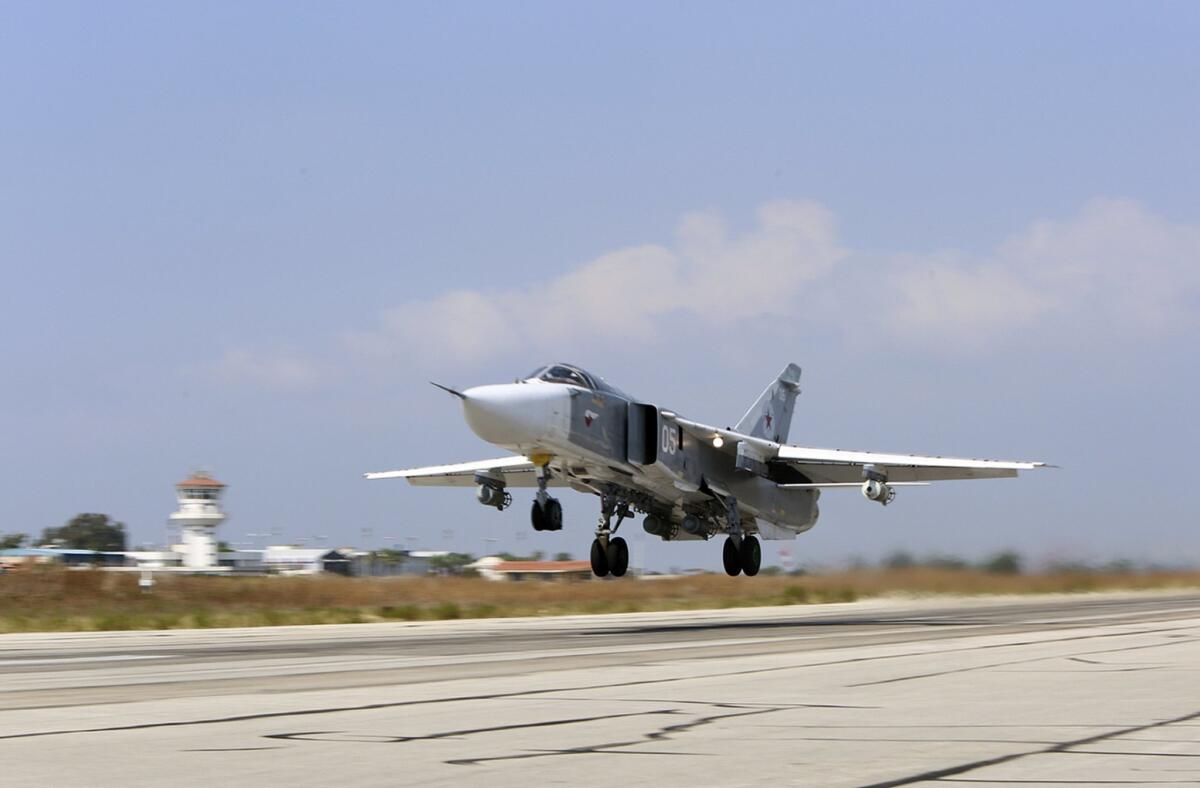Russia admits violating Turkish airspace; NATO says it happened twice

A Russian SU-24M jet fighter armed with laser-guided bombs takes off from Hmeimim air base in Syria on Oct. 3.
- Share via
Reporting from Beirut — Russia’s military involvement in Syria grew more contentious Monday as both Turkey and NATO said Moscow had violated Turkish airspace, prompting Ankara to scramble F-16 fighters and issue a stern warning.
According to a statement from the Foreign Ministry in Ankara, a Russian jet crossed into Turkish airspace Saturday over the southern province of Hatay, which borders Syria. The Russian jet left after it was intercepted by a pair of Turkish air force F-16s, the statement said.
The Russian Defense Ministry issued a statement saying that the plane, an SU-30 Flanker fighter jet, had strayed into Turkish airspace as a “consequence of unfavorable weather conditions,” and that Russian forces had “taken necessary measures to prevent such occurrences in [the] future.”
NEWSLETTER: Get the day’s top headlines from Times Editor Davan Maharaj >>
NATO, however, said two Russian jets had crossed into Turkish airspace, the SU-30 on Saturday and an SU-24 Fencer bomber on Sunday.
The Western alliance implied that the incursions were an intentional provocation.
“The aircraft in question entered Turkish airspace despite Turkish authorities’ clear, timely and repeated warnings,” a NATO statement said. “Allies strongly protest these violations of Turkish sovereign airspace, and condemn these incursions into and violations of NATO airspace. Allies also note the extreme danger of such irresponsible behavior.”
The complaints mark the first reported violations since Russian warplanes began operations last week in support of the government of Syrian President Bashar Assad.
In Madrid for a visit, U.S. Defense Secretary Ashton Carter said the Pentagon was in contact with Turkey and the North Atlantic Treaty Organization concerning a protest of the violation and how to guard against future incursions.
Russia’s airstrikes in Syria, now in its sixth day, are only inflaming an already volatile situation, Carter said at Spain’s Defense Ministry in downtown Madrid.
“Right now, they’re way off track,” he said.
NATO member Turkey is the alliance’s eastern bulwark. NATO Secretary-General Jens Stoltenberg met with Turkish Foreign Minister Feridun Sinirlioglu and convened a meeting to discuss the situation.
“I urge Russia to take the necessary steps to align its efforts with those of the international community in the fight against ISIL,” Stoltenberg said in a statement, using an acronym for Islamic State, the Al Qaeda breakaway faction that controls vast stretches of Syria and neighboring Iraq.
Syria, an ally of Russia, is engaged in a more than four-year war against armed insurgents, some of them backed by the United States, Turkey and other Western allies. The country’s skies are becoming increasingly crowded with combat aircraft, including Russian and U.S. fighter jets, raising concerns about a possible unintended confrontation.
Turkey, like the United States, has criticized the Russian intervention in the Syrian conflict.
Russia says its planes are targeting “terrorists,” but Washington and Ankara say the targets appear to include “moderate” rebel formations, some backed by the U.S. and Turkey. The precise definition of “moderate” in the Syrian context is unclear, however. Western-backed factions in Syria acknowledge coordination with radical Islamist militias such as Al Nusra Front, the official Al Qaeda affiliate in Syria.
On Monday, Turkish authorities said they had summoned the Russian envoy to Ankara and “strongly” protested the weekend incursion, the Andalou state news agency reported.
Moscow was informed it would be held responsible for any “undesired incident” arising from any future violation, state media said.
The Russian jet penetrated Turkish airspace for several hundred yards Saturday, with the breach lasting about two minutes, according to Turkey’s Hurriyet Daily News.
That report was published before NATO made the assertion that there were two incursions.
Turkey’s more than 500-mile-long border with Syria has been a major conduit for opposition forces and supplies entering Syria. Battles have periodically raged in hot spots on the Syrian side of the border, with shells often landing in Turkish territory, prompting retaliatory fire from Turkish batteries. Ankara and Damascus have previously exchanged allegations of airspace violations.
The United States and allied nations have spent more than a year bombarding militant positions in Syria, mostly those of Islamic State.
U.S. and Russian officials said last week that they had discussed ways to improve communications and avoid an aerial face-off.
Last week, Moscow said it had given U.S. officials due warning of its plan to start bombing militant targets in Syria and advised the Pentagon to keep its aircraft away. But U.S. officials said they had only an hour’s notice. Carter labeled the Russian behavior “unprofessional.”
Meanwhile, Russia said Monday that its warplanes had conducted 25 additional sorties in Syria during the previous 24 hours, destroying a militant base and communications hub in the northwestern province of Idlib, a “command center” in neighboring Latakia province and arms depots in Homs province.
To date, the Russian aerial onslaught has been focused on strategic rebel strongholds in central and northwestern Syria. The targeted areas flank heavily populated government bastions in Damascus, the capital, and along the Mediterranean coast.
McDonnell reported from Beirut and Hennigan from Madrid.
Follow McDonnell on Twitter at @mcdneville and Hennigan at @wjhenn
ALSO
North Korea releases detained South Korean student, Seoul says
Russia claims ‘precise attacks’ on Islamic State in Syria airstrikes
Doctors Without Borders closes Afghan hospital, says U.S. may have committed war crime
More to Read
Sign up for Essential California
The most important California stories and recommendations in your inbox every morning.
You may occasionally receive promotional content from the Los Angeles Times.











